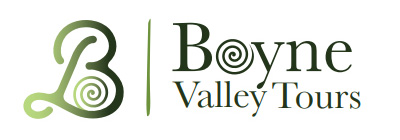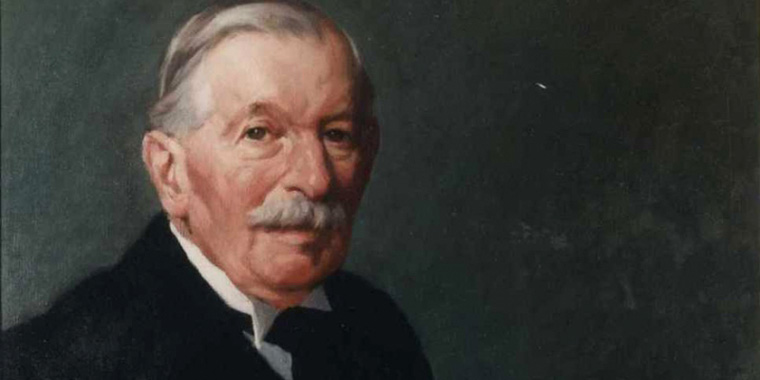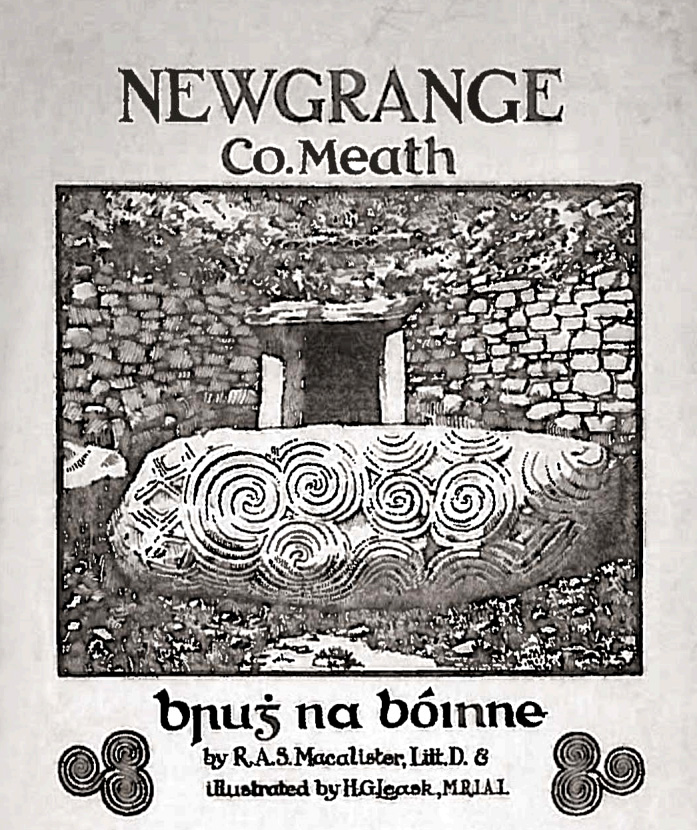R.A.S. (Robert Alexander Stewart) Macalister (1870–1950)
R.A.S. Macalister, archaeologist, epigraphist and Irish scholar, was professor of Celtic Archaeology at University College Dublin from 1909 to 1943. His archaeological research included work on Palestine as well as Ireland.Among the Irish language works he edited for the Irish Manuscripts Commission were facsimiles of two medieval manuscripts, the Book of Uí Mhaine and the Book of Lismore, published in 1942 and 1950. He also prepared a five-volume composite edition of the verse and prose texts known as Lebor gabála Érenn for the Irish Texts Society (London, 1938–56).
His monograph publications included: Ireland in Pre-Celtic times (London, 1921), The archaeology of Ireland (London, 1928), Tara: a pagan sanctuary of ancient Ireland (London, 1931), Ancient Ireland: a study in the lessons of archaeology and history (London, 1935), The secret languages of Ireland, with special reference to the origin and nature of the Shelta language (Cambridge, 1937).
Robert Alexander Stewart Macalister, an Irish Archaeologist
Robert Alexander Stewart Macalister (1870–1950) was an Irish Archaeologist, born on 8th July 1870 into a Dublin family of Presbyterian Scots heritage. He was the eldest son of Alexander Macalister, an anatomist and Egyptologist from Dublin, and Elizabeth Macalister (née Stewart) from Perth, Scotland.Macalister received his education at Rathmines School and the Perse School in Cambridge, England, graduating in mathematics from St John's College, Cambridge, England in 1892. His interest in geology led him to research at the Sedgwick Museum of Geology, where he also taught prehistoric archaeology before the establishment of the archaeological and anthropological tripos.
In 1895, he returned to Ireland, became a member of the Royal Society of Antiquaries of Ireland, and began a prolific series of publications spanning various topics, reflecting his wide-ranging interests. These included the archaeology of Ireland and western Europe, languages, epigraphy, the history of the Near East, Celtic studies, music, the history of ecclesiastical vestments, among others. His publications prominently featured inscriptions, especially ogham, with notable works such as Studies in Irish Epigraphy between 1897 and 1907 and the two-volume inventory, Corpus Inscriptionum Insularum Celticarum (1945, 1949).
His professional career can be divided into two phases: one as an excavator employed by the Palestine Exploration Fund, and the other as a professor of Celtic archaeology at University College Dublin (UCD) from 1909 to 1943. Between 1898 and 1909, he conducted extensive work in Palestine, particularly at Gezer, which resulted in three volumes published in 1912, setting a new standard for archaeological reports in precision of detail.
As a professor at UCD, Macalister focused on Irish antiquities and played a key role in the Gaelic revival. He was instrumental in the professionalization of archaeology in the Irish Free State, serving as the first chairman of the National Monuments Advisory Council (1930–1943) and holding positions in various scholarly societies. He advocated for legislation to protect the archaeological heritage and authored several influential books, including A Textbook of European Archaeology (1921) and The archaeology of Ireland (1928).
Professor Macalister began excavations at Knowth megalithic passage tomb in the Boyne Valley in July 1941 and it was revealed that at Knowth, and other passage tombs, cremation was the burial rite.
Macalister's friendships included prominent figures such as Éamon de Valera and Douglas Hyde, and he was known for his generosity and old-world courtesy. After retiring due to health reasons, he lived in Cambridge until his death on April 26, 1950.
Boyne Valley Private Day Tour
 Immerse yourself in the rich heritage and culture of the Boyne Valley with our full-day private tours.
Visit Newgrange World Heritage site, explore the Hill of Slane, where Saint Patrick famously lit the Paschal fire.
Discover the Hill of Tara, the ancient seat of power for the High Kings of Ireland.
Book Now
Immerse yourself in the rich heritage and culture of the Boyne Valley with our full-day private tours.
Visit Newgrange World Heritage site, explore the Hill of Slane, where Saint Patrick famously lit the Paschal fire.
Discover the Hill of Tara, the ancient seat of power for the High Kings of Ireland.
Book Now
Home
| Visitor Centre
| Tours
| Winter Solstice
| Solstice Lottery
| Images
| Local Area
| News
| Knowth
| Dowth
| Articles
| Art
| Books
| Directions
| Accommodation
| Contact


